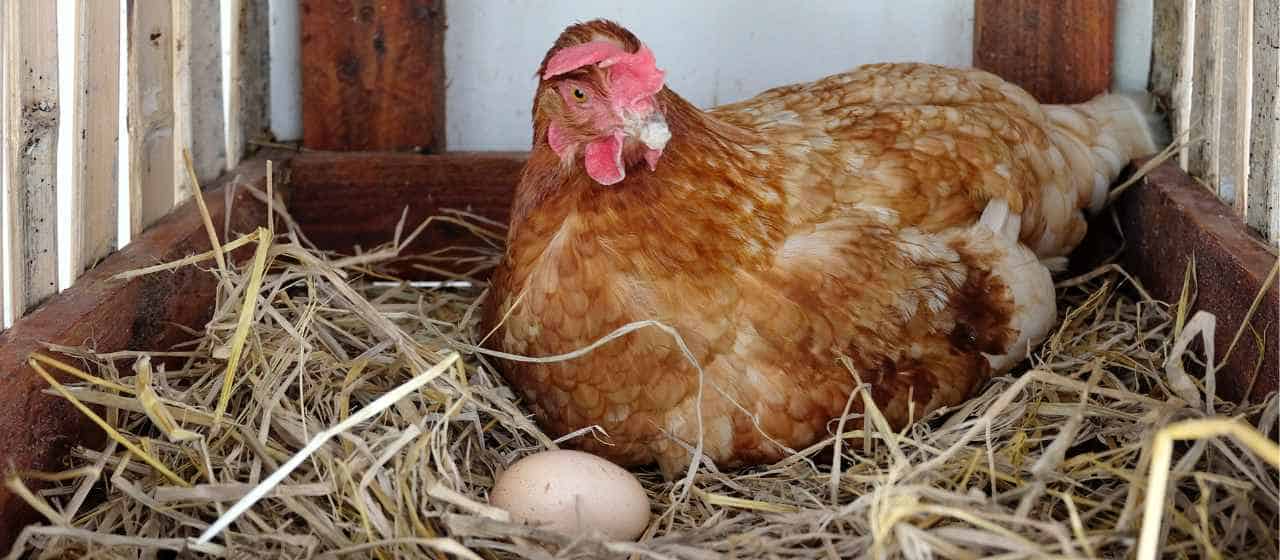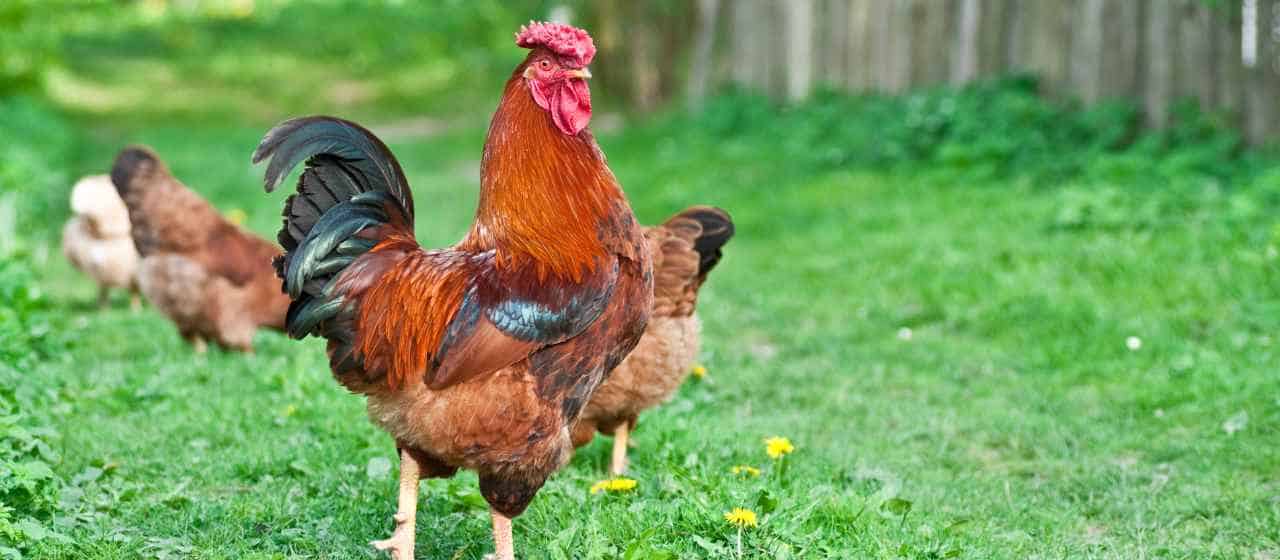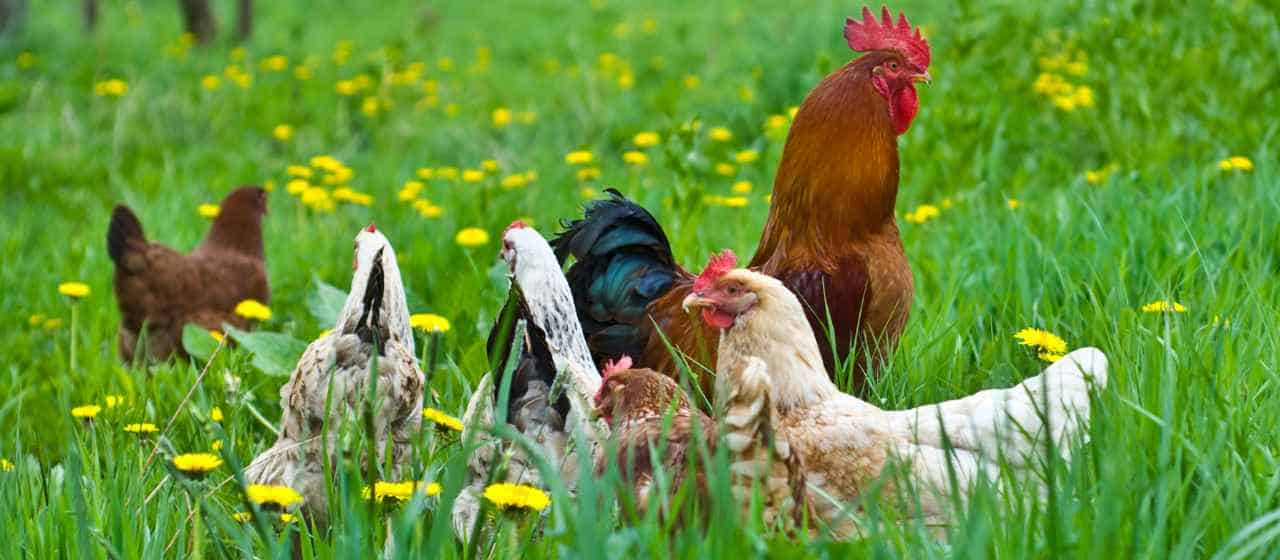When are hens happier without a rooster and when is it better to have a rooster around? Those are the flock management questions I’ll try to help you with in this post so you can figure out if you need to add a rooster to your homestead or backyard flock.
Common Question: Do Hens Need Roosters To Lay Eggs?

Hens don’t need roosters to lay eggs! If you just want eggs to eat, you only need hens in your flock. Hens ovulate just the same without a rooster around.
But if you want fertile eggs so you can hatch chicks and increase your flock size, then you’ll definitely need a rooster around to mate with your hens.
The number of roosters you’ll need for fertile eggs depends on the size of your flock. As a rough guide, you’ll need 1 rooster for every 8 to 12 hens.
The lack of a rooster won’t change the quantity of eggs your hens lay either, and without a rooster, you’ve got one less mouth to feed.

Are Hens Happier Without A Rooster?
I’ve raised chickens for 16 years and from my observations, I’m going to say hens are happier with a rooster in the flock.
- Roosters protect hens and sound the alarm when they detect danger.
- Roosters find food for the hens and call them over to eat it.
- Roosters establish a natural pecking order and stop the hens from bickering too much.
However, the wrong rooster can upset and even injure your hens, so it’s wise to select a rooster for his temperament.
When you’re adding a rooster to your flock, you really want a gentleman.
Let’s look at the benefits a rooster can bring to your flock, as well as some problems you could encounter if the rooster isn’t a good fit.
Benefit #1 Roosters Protect Hens

If you’re free ranging your flock, a rooster is essential to safeguard your hens. He won’t always be able to drive off a predator, but he’ll do his best, and the rooster will always head into battle, launching himself at the threat even if it means his certain death.
While he’s fighting, the hens have a chance to escape to safety.
A rooster is no match for a loose dog, or a larger predator, but a big rooster like a Plymouth Rock or an Orpington can put up a good fight against a fox or a raccoon. While he’s out with his hens, a rooster is always on high alert, and he’ll sound the alarm as soon as he senses danger.
That danger often comes from above, and your hens and their chicks are easy pickings for large birds of prey. When a rooster sees a shadow passing overhead, he’ll make the alarm call and hurry everyone under cover so they can’t be scooped up and carried off.
Here at the homestead, we have hawks that nest in the area every year. It’s wonderful to watch them soar and circle overhead, but our chickens don’t enjoy their presence at all and they shriek and run for cover when they spot them.
While our hens are too big for the hawks to take, for the few months the hawks are around, we make sure any chicks we’ve got are safely enclosed in chicken tractors.
Another way a rooster keeps hens safe is by herding them away from thick, scrubby areas where danger could be lurking. And if the hens are straying too far from home ground, the rooster will guide them back to safety.
Benefit #2 Roosters Find Food For Hens

Hens rarely share food with each other, instead they greedily hoover up any tasty morsels they find. But Roosters frequently offer their hens the bugs, worms, seeds and berries they find as they scratch around.
When a rooster unearths something good to eat, he’ll excitedly call to the hens to get their attention. And if he’s trying to impress one hen in particular, he’ll take the food and drop it at her feet while he hops around and bobs his head up and down, making a spectacle of himself.
It’s the chicken version of flowers and a romantic dinner!
This tidbitting, as it’s called, is a behavior you’ll observe in mother hens too. To teach her chicks what’s good to eat, she’ll make excited noises and repeatedly pick up the morsel and drop it in front of the chicks to encourage them to try it.
Benefit #3 Roosters Keep The Pecking Order Stable
When you’ve got a rooster in your flock, he’ll be at the top of the pecking order. The pecking order is the hierarchical social structure chickens live in.
Every chicken has a place in the pecking order, although subtle and not-so-subtle challenges are always taking place as hens try to improve their standing. If status-seeking behavior gets too rough, the rooster will step in and tell the girls to knock it off.
Without a rooster in the flock, a hen will take the dominant position, but she doesn’t have the same instinct that a rooster has for a peaceful pecking order and she won’t step in to stop disputes.
Hens of the same age and breed are also fairly evenly matched, which means your hens will always try to take the top spot for themselves.
That doesn’t mean you’ll have a flock of constantly fighting hens, but there’ll undoubtedly be more arguments and a higher level of stress within the flock.
And in a worst-case scenario, several hens could gang up on a less assertive hen, bullying and attacking her badly enough to cause serious injury or death.
When A Rooster In Your Flock Could Be A Problem
Now we’ve looked at the benefits of keeping a rooster with your hens, let’s see what kind of problems a rooster can bring to your flock.
- Roosters are noisy.
- Roosters can be rough on the hens.
- Roosters can be aggressive with humans.
Problem #1 Roosters Make A Lot Of Noise

Keep chickens for long enough and the noise the roosters make fades into the background. And if you’re out in the country, their noise won’t usually bother anyone else.
But there are some situations where a crowing rooster could cause you problems.
If you’re keeping a backyard flock and you’ve got neighbors in close proximity, they’re likely to get more than a little fed up with a 5 a.m. wake-up call every morning.
What can you do to keep the noisy boy quiet?
Keep your coop as dark as possible by installing shutters or boards over any windows in the coop. In a dark coop, chickens and roosters think it’s nighttime and doze on their roosts.
By the time they need to go outside, the rest of the neighborhood should be awake.
If you’re keeping (or trying to keep) a secret backyard flock in an area where local ordinances prohibit residents from raising chickens, you’ll give yourself away if you add a crowing rooster to your flock.
For a quiet flock, stick with hens, and make sure they’re from a relaxed, quiet breed like the Sussex chickens, Orpingtons, or Wyandottes.
These hens don’t make a fuss, and they don’t sing a loud egg song every time they lay an egg.
Problem #2 Roosters Can Be Rough On Hens

Your hens won’t be happy with a rough rooster around.
Because of the way chickens are bred these days, the gentlemanly characteristics of roosters eager to dance for and court hens are in short supply.
In the best circumstances, when a rooster wants to mate with a hen, he’ll tidbit for her (as described earlier) perform a nesting court, or he’ll dance.
Yes, roosters dance!
An amorous rooster won’t just jump on the back of the nearest hen, instead he’ll spread his wings and quiver as he circles around the hen, signaling his intention.
If the hen is interested, she’ll crouch down and allow the rooster to mate with her. In this scenario, everyone is happy.
You see a more obvious display of this quivering in male peacocks when they fan out their tail feathers and rattle them to impress a mate.
When a rooster doesn’t have the instinct to court a hen, he’ll rush at her in an effort to catch her and pin her down.
Obviously, hens don’t like this, and they run! But the rooster catches them, anyway. Then he jumps on the hen’s back and holds her down, and grabs her neck feathers in his beak.
Other injuries to hens can occur because the long, sharp spurs on the back of the rooster’s legs dig into the hen’s back.
Even when no physical damage has taken place, hens are clearly unhappy with this kind of treatment. They get up, give their feathers a brisk shake, and strut away in indignation.
Roosters will mate with the flock up to 30 times a day, so if you get a brutish rooster, he won’t give your hens much peace. And if your flock of chickens is on the small side with only 6 to 8 hens, they’ll all receive multiple visits from the rooster each day.
It’s possible to purchase hen saddles that offer some protection from overly enthusiastic roosters, but while saddles prevent injury, it does nothing to stop the behavior.
When you’re looking to add a rooster to your flock, check local sources and visit the breeder so you can observe several roosters interacting with hens before you make a selection.
Problem #3 Roosters Can Be Aggressive To Humans

Aggression in roosters is usually a result of their breed, but gentle roosters can go on the attack at times.
Gamey breeds like the Old English Game and Indian Game are known for their aggressive behavior.
Aggression is sometimes desirable when you want a rooster with the best chance of fighting off predators, but otherwise, an angry rooster is a pain in the you-know-where.
I’ve had roosters that were very gentle most of the time but would sometimes fly at us in a rage for no apparent reason at all.
Being attacked by a big rooster is no fun! An attack leaves you shocked and bleeding. I’ve got a scar on my arm from a Cornish rooster that grabbed hold with his sharp beak and wouldn’t let go.
But that rooster was an absolute gentleman with his hens.
One way to lessen possible aggression towards you is to give the rooster plenty of treats so he sees you as a friend rather than a foe. Another good tactic is giving the rooster plenty of time to see you as you approach, so you don’t surprise him.
Over To You

Hopefully, you’ve got a good grip on the pros and cons of adding a rooster to your flock.
Are hens happier without a rooster? That depends on the rooster.
A courteous rooster who takes care of your hens will be an asset to your flock, and since roosters are always very handsome with their colorful plumage, he’ll be a beautiful bird to have around.
On the other hand, a wam-bam-thank-you-ma’am type could leave your hens thoroughly fed up, with their feathers plucked out, and scrapes and lacerations on their backs.
If you’re free ranging your flock, I’d say a rooster is essential for protection, and your hens will be happier with a guardian around. But a rooster won’t be essential if your hens are contained in a run and you don’t plan on raising any chicks.
Thanks for reading: Are hens happier without a rooster? I hope this post has helped you make up your mind about the best composition for your flock.


